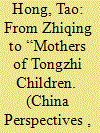|
|
|
Sort Order |
|
|
|
Items / Page
|
|
|
|
|
|
|
| Srl | Item |
| 1 |
ID:
184579


|
|
|
|
|
| Summary/Abstract |
This paper mobilises interactionist sociology to explore the biographies and moral careers of two former zhiqing who emerged, circa 2007, as well-known mother figures in a dynamic tongzhi blogosphere. Their encounter with young tongzhi inaugurated parental advocacy for their sexually nonconforming children in China. By anchoring tongzhi activism in contemporary Chinese history and reconstructing two parallel processes of activist-becoming, this paper seeks to better understand how political agency emerged in an authoritarian setting while making a case for studying activism as historicised meaning-making activities.
|
|
|
|
|
|
|
|
|
|
|
|
|
|
|
|
| 2 |
ID:
148771


|
|
|
|
|
| Summary/Abstract |
During the 1980s, the immediate memory of the Maoist rustication movement expressed itself almost exclusively through the vector of literature, but since 1990, for reasons worth reflecting upon, a wide range of memorial activities have developed, involving a large number of the former educated youth (zhiqing). In the 2000s, this field benefited from the generalization of the internet and is still very much alive today. At each stage, this mainly popular or unofficial (minjian) memory had to negotiate a breathing space with a party-state still intent on controlling history and collective memory, especially concerning any topic directly linked with the Cultural Revolution. Thus, if memories of an important event are always varied because of the different personal experiences of the past and different individual situations and aspirations in the present, the spectrum of the zhiqing memories has also been complicated by political considerations. This paper does not try to present an exhaustive picture of this large memorial field; instead, through different examples, it attempts to reflect upon the meaning of the strong memorial aspirations of the zhiqing. It argues that only a genuine respect for history (as shown in the remarkable endeavours of some former zhiqing) will help this generation to transcend the conflict of memories to find meaning in its own fate.
|
|
|
|
|
|
|
|
|
|
|
|
|
|
|
|
| 3 |
ID:
089776


|
|
|
|
|
| Publication |
2009.
|
| Summary/Abstract |
This article examines, both in internal and international contexts, the petition of the zhiqing in Xishuangbanna, Yunnan, during the 1978-79 transition. It first shows how a shortage of labour on Xishuangbanna state rubber farms led to the arrival of the zhiqing from other regions. It then reviews their lives and sufferings of these revolutionary youths, followed by an analysis of the petition in terms of its process and result. This article proposes three key reasons for the win-win result: the extraordinary leadership and organization of the zhiqing, factional struggles within the Chinese Communist Party, and the Sino-Vietnamese War. Finally, it attempts to fit this event into recent literature on mass resistance in contemporary China.
|
|
|
|
|
|
|
|
|
|
|
|
|
|
|
|
|
|
|
|
|